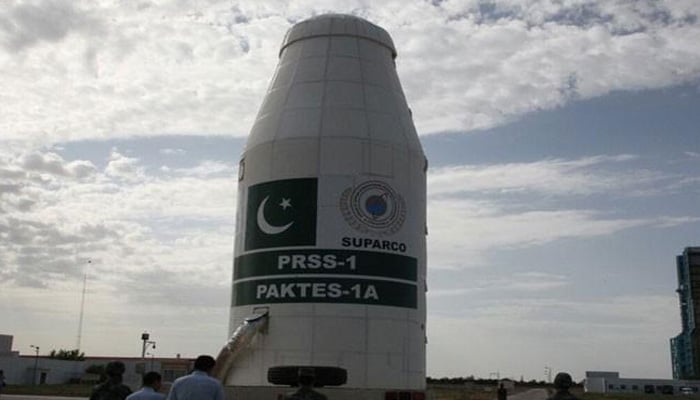Pakistan’s first remote sensing satellite becomes operational
ISLAMABAD: Pakistan’s first Remote Sensing Satellite (PRSS-1) and indigenous Technology Evaluation Satellite (PakTES-1A) have become fully operational, according to the Ministry of Planning, Development and Reform.
The satellites were successfully launched from Jiuquan Satellite Launch Centre, China on July 9, 2018. The planning, development and reform ministry shared the news on its social media: “After the successful tests in the orbit, the #satellites are fully operational and today, the control of PRSS-1 Satellite has been successfully transferred to Ground Control Stations in #Pakistan!”
The PakTES-1A is a 285-kg satellite equipped with an optical payload commensurate with national needs. It has a design life of three years. With its launch, Pakistan has become one of the few countries to have its own remote sensing satellite in the orbit.
The PakTES-1A, indigenously designed and developed by #SUPARCO’s engineers, is equipped with an optical payload, Global Positioning System (GPS) and Geographical Information System (GIS).
PakTES-1A and PAKSAT-1R will operate at an altitude of 640 km and 610 km, respectively, and would also enable the country in agriculture classification and assessment, urban and rural planning and water resource management.
They will also help in assessing the situation of forestation, rainfall and storage of rainwater. The satellites would help Pakistan end its reliance on commercial satellites for environmental monitoring particularly to address the challenges of floods, drought and water shortage.
In this connection, President Mamnoon Hussain expressed the hope that the launching and operationalisation of these satellites will add to the confidence of our space engineers and related technical personnel.
He also appreciated the efforts of SUPARCO’s engineers and scientists in achieving a yet another milestone in the space domain, coinciding this feat with Pakistan’s 71st Independence Day.
-
 Eric Dane's Costar Under Fire For Hurling Accusations At Him After His Death
Eric Dane's Costar Under Fire For Hurling Accusations At Him After His Death -
 Queen Camilla Greets The Paddington Bear At BBC’s 500 Words Grand Final
Queen Camilla Greets The Paddington Bear At BBC’s 500 Words Grand Final -
 Chinese Astronauts Finally Reveal Why Spacecraft Left Them ‘stranded’ For 437 Days In Space
Chinese Astronauts Finally Reveal Why Spacecraft Left Them ‘stranded’ For 437 Days In Space -
 Sinitta Makes Shock Admission About Marriage To Andy Willner Post Simon Cowell Heartbreak
Sinitta Makes Shock Admission About Marriage To Andy Willner Post Simon Cowell Heartbreak -
 Bill Gates Calls Ties To Jeffrey Epstein 'huge Mistake,' Reveals Past 'affairs'
Bill Gates Calls Ties To Jeffrey Epstein 'huge Mistake,' Reveals Past 'affairs' -
 Switzerland Announces One-time Compensation For Swiss Bar Fire Victims
Switzerland Announces One-time Compensation For Swiss Bar Fire Victims -
 Ryan Coogler Shares Thoughts About Building Community Of Actors Amid 'Sinners' Success
Ryan Coogler Shares Thoughts About Building Community Of Actors Amid 'Sinners' Success -
 Heidi Klum Gushes Over Diplo Collab 'Red Eye' Despite DJ Falling Asleep During Video
Heidi Klum Gushes Over Diplo Collab 'Red Eye' Despite DJ Falling Asleep During Video -
 Israel Behind Majority Of Journalist Deaths Worldwide, Watchdog Claims
Israel Behind Majority Of Journalist Deaths Worldwide, Watchdog Claims -
 'It Would Become A Circus' : Inside Jane's Turmoil For 'little Sister' Fergie Whose Hidden From The World
'It Would Become A Circus' : Inside Jane's Turmoil For 'little Sister' Fergie Whose Hidden From The World -
 Inside Cardi B's Real Feelings Related To Stefon Diggs Split Post One Year Of Romance
Inside Cardi B's Real Feelings Related To Stefon Diggs Split Post One Year Of Romance -
 Former Sri Lankan Intelligence Chief Arrested Over 2019 Easter Bombings
Former Sri Lankan Intelligence Chief Arrested Over 2019 Easter Bombings -
 Kristen Bell Shares One Rule For 'SAG' Awards Ceremony That She Will Ditch This Time: 'Happy And Fun'
Kristen Bell Shares One Rule For 'SAG' Awards Ceremony That She Will Ditch This Time: 'Happy And Fun' -
 Woman Suing Meta Platforms, YouTube Over Social Media Addiction Sticks To Claims After Trial
Woman Suing Meta Platforms, YouTube Over Social Media Addiction Sticks To Claims After Trial -
 Shakira Applauded For 'gracious' Behaviour By Fans As She Blends Work With Family Downtime
Shakira Applauded For 'gracious' Behaviour By Fans As She Blends Work With Family Downtime -
 Mexico’s President Considers Legal Action Over Elon Musk Cartel Remark
Mexico’s President Considers Legal Action Over Elon Musk Cartel Remark




